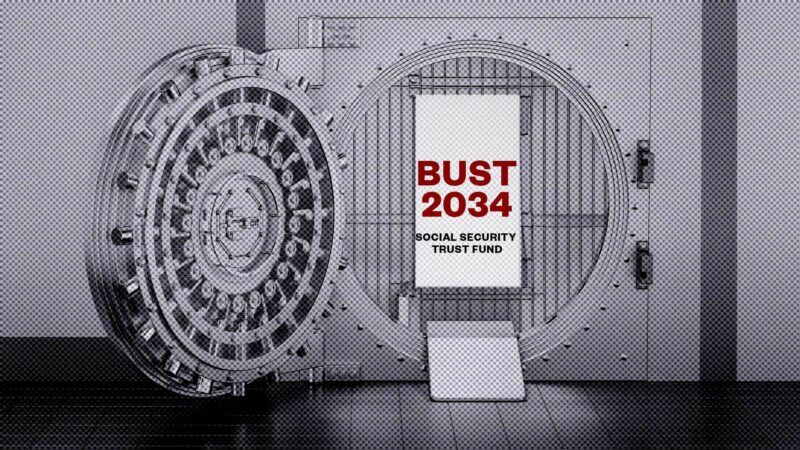We're 8 Years Away From an Automatic 23 Percent Cut in Social Security Payouts
Social Security’s board of trustees expects the program to be insolvent in eight years.

Reckless spending has been driving Social Security toward a fiscal cliff. Scheduled benefits will have to be cut by 23 percent in 2033 to keep the program solvent.
This is the grim conclusion drawn by the trustees of Social Security's Old-Age and Survivors Insurance and Disability Insurance (OASDI) trust funds, who published their annual report this week. OASDI comprises two trust funds, but the main one—the Old-Age and Survivors Insurance (OASI) trust fund—is on track to be depleted in 2033. That means all retirees receiving benefits in that year will face a 23 percent cut to their monthly checks.
The trustees' report also warns that OASDI will become insolvent in 2034. The trustees calculate this earlier depletion date in part because of a law Congress passed late last year to expand Social Security benefits to some workers who previously did not receive them.
Reason's Eric Boehm explains that the Social Security Fairness Act expanded Social Security benefits to public sector workers hired before 1984, despite those workers being exempted from contributing to the payroll taxes that fund the program. The Cato Institute's Romina Boccia and Ivane Nachkebia affirm that the "significant worsening of the program's finances since last year is largely the result of the repeal of the Windfall Elimination Provision (WEP) and Government Pension Offset (GPO)," which reduced Social Security payouts to public workers and their spouses.
The trustees highlight two other factors hastening the depletion of OASDI's trust funds. First, they project that the country's total fertility rate of 1.62 children per woman today won't reach 1.9 children per woman until 2050 (10 years later than originally anticipated), which means fewer workers to support beneficiaries. Second, they anticipate the ratio of total labor compensation to gross domestic product to be 61.2 percent in 2034—1.6 percentage points lower than projected in last year's report—which means lower taxable payroll income (OASDI is funded primarily by employment taxes).
OASDI's smaller trust fund, Disability Insurance (D.I.), provides monthly benefits to disabled workers and their families. Despite D.I. paying out $155 billion to 8 million recipients in 2024, D.I. ran a $36 billion surplus, increasing its reserves to $183 billion. OASI, meanwhile, paid out $1.316 trillion in Social Security benefits to 60 million Americans, running a $103 billion deficit and decreasing its reserves to about $2.5 trillion.
If Congress passes a law permitting the Social Security Administration to dip into the D.I. trust fund to cover OASI's shortfalls, then OASDI's combined reserves will be "depleted and unable to pay scheduled benefits in full on a timely basis in 2034," at which time the program's continuing income will be sufficient to pay only 81 percent of scheduled benefits.
The fiscal crisis for OASDI began in 2010, when its costs exceeded its non-interest income. The outlook worsened in 2021, when Social Security's costs exceeded its income, including interest, forcing the program to dip into its $2.9 trillion "trust fund"—mostly an accounting gimmick consisting of claims on Treasury bonds bought from 1984 to 2009 with the program's surplus income—to make up the difference.
As of December 31, 2024, OASDI's total reserves were $2.7 trillion, roughly $200 billion lower than they were in 2021. And it's losing money at an increasing rate: OASDI's 2024 deficit of $67 billion was $26 billion greater than it was in 2023.
In short: More beneficiaries, fewer workers, and less taxable employment income than expected mean higher deficits and an earlier depletion of Social Security's reserves.


Show Comments (27)